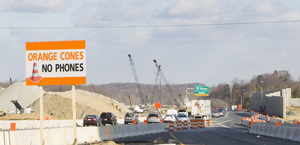

Construction firms are getting behind this month's sweeping recommendation from the National Transportation Safety Board that calls for a nationwide ban on phoning and texting while driving.
"From a work-zone perspective, we would be 100% supportive," says Brian Deery, who heads the Associated General Contractors' highway and transportation division. "Generally, you could say we're all in favor of it."
The safety board unanimously recommended that all U.S. drivers be barred from using cell phones and portable electronic devices—even hands-free devices—in non-emergencies while behind the wheel. The recommendation, issued on Dec. 13, followed a NTSB meeting on the causes of a 2010 traffic accident in Gray Summit, Mo., in which a pickup truck hit the back of a truck-tractor, causing a pileup that killed two people and injured 38 others.
NTSB’s investigation of the multivehicle accident showed that the driver of the pickup had sent and received 11 text messages on his cell phone in the 11 minutes before the pickup hit the truck-tractor. It cited distraction as the tragedy's probable cause.
The Missouri accident is the latest involving people distracted by cell phones or other electronic devices that the board has investigated in recent years. NTSB cited five other accidents since 2004, including highway, aviation, rail and barge accidents, in which 38 were killed and dozens injured.
“It’s time to curb the carnage on our roads from distraction-related accidents,” says NTSB Chairman Deborah A.P. Hersman. She cited a study by the Virginia Tech Transportation Institute that found a “safety-critical event” is 163 times more likely to occur if a driver is sending or receiving text messages, e-mailing or using the internet.
The safety board, an independent federal agency, has no regulatory authority and cannot mandate changes in operations, equipment or policy. But its recommendations carry weight with other federal regulatory agencies.
Truckers Can't Text
Commercial drivers already face tighter restrictions. In November, the Federal Motor Carrier Safety Administration issued a new rule banning commercial drivers from reaching, holding or dialing a phone while on the road. Hands-free devices are allowed while push-to-talk phones are not. Operators who violate the rule can be fined up to $2,750, and carriers that allow such behavior could face penalties of up to $11,000.
"There is some serious, serious distracted driving going on out there," says Deery. "Anything we can do to pay better attention is going to be very helpful." In 2010, FMCSA banned operators from texting while driving.


Post a comment to this article
Report Abusive Comment